GSE Cohort 1 Retrospective | BanklessDAO Weekly Rollup
Catch Up With What Happened This Week in BanklessDAO
Dear Bankless Nation 🏴,
This week’s Community Call roundtable included discussion of the Community Vote results, which will inform the Season 6 specification. Community members voted for their preferences on aspects such as membership thresholds, seasonal budgets, and contributor rewards. Though a brief discussion, it was a good time to bring up topics and concerns, because these things are what help us grow.
They say the bear market is for building, and one good example of this is the BanklessDAO Writers Cohort. The Writers Guild has been growing in leaps and bounds all through this season, upskilling folks in both writing and governance, as well as fostering our social media presence. The second Writers Cohort definitely brought in more vibez, and this week the guild was pleased to announce that there will be a third cohort kicking off in mid-November, with more details on this to come in the next Community Call.
What is a community if we can’t help one another? The InfoSec team is looking to build a downloadable tool to warn people of potential scams, DAO Dash is planning on partnering with guild role holders to help automate the active member count process, and the Ombuds team is just one click away to help mediate any dispute. Help is at every corner.
To cap things off, well done to these DAO members who have just gained Level 2 contributor status: MinaHasNoIdea, Romko.eth, and stackthat.eth; we congratulate them on this well-deserved recognition!
Contributors: Deewon, Warrior, WinVerse, anointingthompson1.eth, kornekt, NF Thinker, GPe, raybankless.eth, Austin Foss, Dippudo, d0wnlore, Liquidiot, HAshBrown27, Trewkat, siddhearta, HiroKennelly
This is an official newsletter of BanklessDAO. To unsubscribe, edit your settings.
🙏 Thanks to Our Sponsor
MetaMask Institutional
Today there are close to 5,000 official DAOs revolutionizing the structure of traditional organizations and giving ownership back to builders and creators.
However, new structures breed new challenges. In the spirit of web3, we seek to overcome these challenges together.
On November 3, join experts from MetaMask Institutional and the ConsenSys Cryptoeconomic Research team as they share best practices and lead breakout sessions around core DAO ops problem areas including governance, treasury management, payments, community engagement and development.
Across these rooms expect to discuss the following topics:
The ‘hierarchy of needs’ around treasury management
Creating an investment policy statement for your DAO
What is decentralized identity (DID) and how to erect DID systems with your DAO
DAO governance and legal ramifications
DAO tokenomics
Popular web2 and web3 DAO tools
👉 Register now.
GSE Cohort 1 Retrospective
Author: Austin Foss
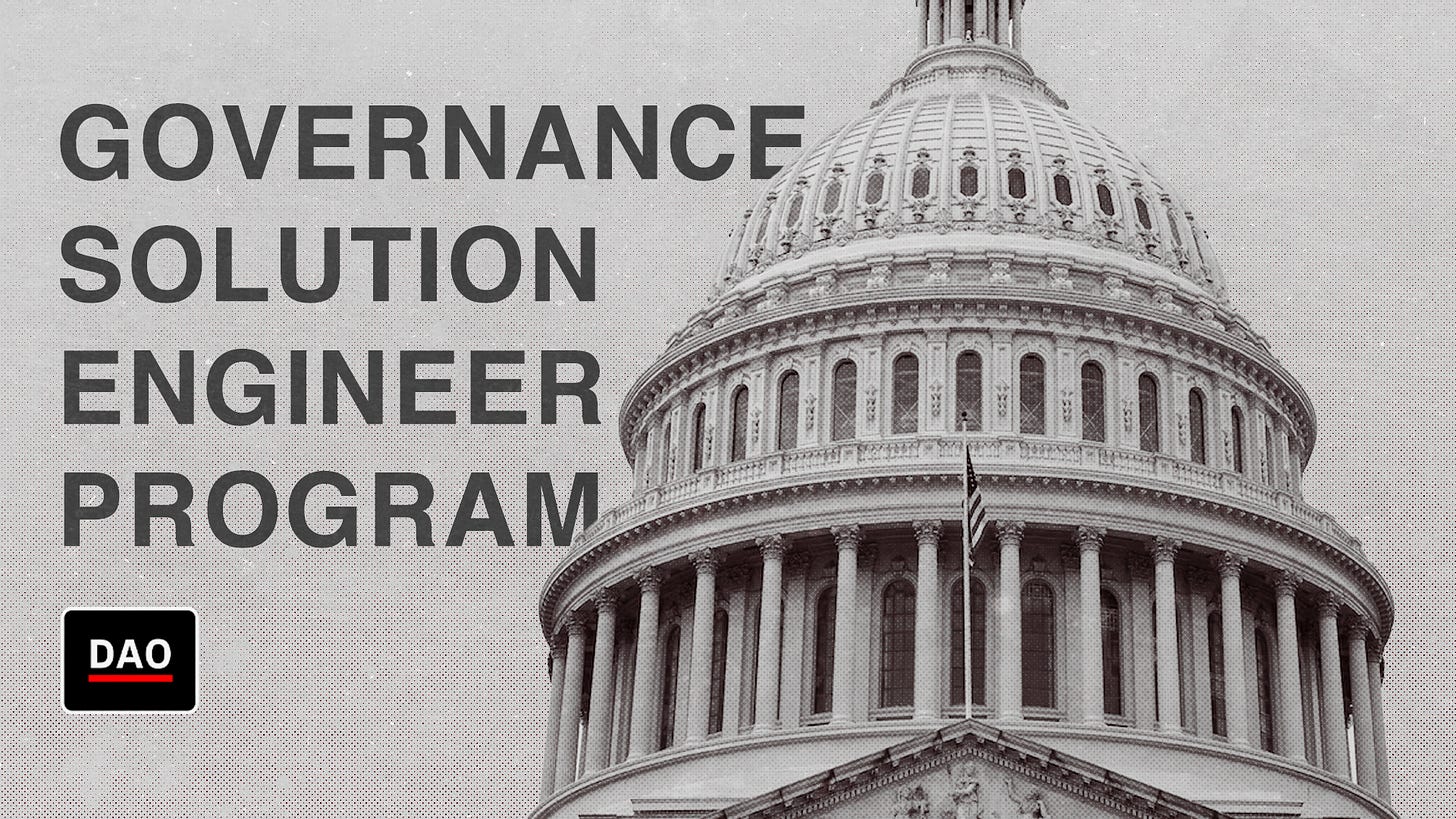
Our Governance Solution Engineer (GSE) program’s first cohort is wrapping up at the end of Season 5. This team aimed to improve various aspects of our DAO, and has recently delivered a report on their work during the last two seasons.
It’s been nearly a year since the idea of creating a working group to address governance issues was first proposed. The journey to implementing the first GSE program recommendation, the Constitution and bDIP, is its own story, lasting two seasons.
Let’s dig in.
A Quick History
In December 2021, frogmonkee, one of bDAO’s original contributors, began laying the foundation for this new structure. His stated purpose was to form a team to work on the DAO as opposed to working in the DAO. Solving DAO-wide scaling problems is hard work, and continued evolution as new problems emerge requires a different perspective than one might have from inside a guild or project. This would be the GSE’s primary task: to work on the DAO’s structure and governance procedures.
A month later in January 2022, frogmonkee built upon those first principles and published the second draft for implementation of this working group. With broad DAO support the proposal moved to Snapshot before the end of the month, along with an election for the first cohort. Although the proposal had unanimous approval on the Forum, it fell short of the established 36.8 million BANK quorum; the final result was 23 million BANK in favor and 3.9 million against.
Removing the quorum took another proposal and the subsequent Snapshot vote, held in February, reached the quorum (one last time). One day after the completion of that Snapshot, the final proposal to implement the GSE program was published on the Forum and then finally passed Snapshot with 22 million BANK in favor. The first GSE cohort was elected via a concurrent Snapshot, valid pending the positive outcome of the program vote. All the candidates’ applications are available on Notion.
The GSE's First Cohort
The first cohort of the GSE program consisted of five well-known and strong contributors to bDAO: Above Average Joe, Saulthorin, Rotorless, Manuel Maccou, and 0xJustice. There were three primary deliverables set for this first cohort: a risk framework and financial report, a DAO constitution and improvement standard, and a compensation framework. For a full list of focus areas and requirements, review the Governance Solution Engineer Program - Re-Implementation proposal which formed the basis for the Snapshot vote.
Financial Analysis of Guilds and Projects
On July 21, 2022 the GSE published a financial report which indicated that almost all guilds and project teams had significant BANK left over at the end of each season. At the end of S3 there was 8.5 million BANK remaining in project and guild multi-sigs.
Feedback when the report was first published highlighted that the analysis was missing figures from the end of S4, which have since been added and can now be compared with the prior season. To highlight one example for interest: in S3 the Grants Committee (GC) was allocated ~13.33 million BANK, then in S4 was provided with 11.5 million. Because these amounts were added to the previous season’s unspent balance each time, the cumulative effect was that just over 9 million BANK remained in the GC multi-sig at the conclusion of S4. To be fair, the GC received fewer project funding proposals in S4, and as a result allocated only two thirds of the amount outgoing in S3.
There is detailed information in the full report and little doubt that continuous reporting on seasonal spending will be invaluable for evidence-based decision making. It could also have contributed to the development of both the risk and compensation frameworks, although the update is nearly silent on both those aspects.
BanklessDAO Constitution and Contributor Handbook
Around the same time as the financial analysis, a proposal detailing the Bankless Constitution and associated BanklessDAO Improvement Proposal (bDIP) standard was posted, seeking community input on both documents. A revised proposal proceeded to a Snapshot vote in late September; both documents were officially adopted and are available via the bDAO GitHub repository.
The Constitution attempts to capture the current state of the DAO’s organizational structure and governance processes, while the bDIP standard provides a mechanism for updates to the Constitution. Keep in mind that changes to the Constitution are not simply changes to a document; they are changes to the operational and governance procedures of BanklessDAO.
The BanklessDAO Constitution contains seven sections:
BanklessDAO
DAO Membership Levels
DAO Organizational Units
DAO Cycles (Time Cycles)
DAO Governance
DAO Funding
Code of Conduct
As Season 6 is right around the corner it's a good idea for everyone to familiarize themselves with the content. To help us get up to speed, the Bankless Academy team has produced a lesson and will reward completion with a badge in the form of a soulbound token.
Recommended bDIPs
With the bDIP process now ratified, the GSE has provided a list of possible first bDIPs:
Revamped Membership
Revamped Leveling System
Revamped Org Units
Seasonal BANK Buyback Program
Project Funding Roadmap
DAO Legal Service
Evolve GSE to Permanent Body
Rigorous DAO Reporting
Judicial Offboarding Framework
These are just the GSE’s first recommendations to submit to the bDIP process but now that we have a ratified standard for implementing such proposals, any member can use the bDIP template and share their idea to the Forum.
Quorum Dilemmas
In relation to the aforementioned Snapshot quorum, the DAO has a loose end to tie up. One of the GSE’s first tasks, as stated in the Quorum Removal Vote, was to have been the implementation of a new, more realistic quorum:
“Our plan is to abolish the quorum requirement with this vote, then re-propose the votes so that we can implement the GSE, then the GSE will re-propose a more researched quorum requirement.”
This task has not been completed. Instead, according to the Constitution, the DAO operates with previously ratified quorum levels which apply to Forum proposals, not Snapshot. Or, do we? … Grants Committee has its own procedure in relation to quorum on Forum proposals. Regarding Snapshot voting, the Constitution is clear:
“The final step in the governance process is a Snapshot vote. Snapshot is an off-chain token voting tool. If a proposal has met the required quorum and approval threshold on the Forum, it will progress to a DAO-wide Snapshot vote. Snapshot proposals run for 7 days and require >66% approval.“
The Forum proposal which gave the DAO its current Forum quorum is titled [Draft 3 - Final] Firming Up Governance. It is a long and convoluted post, and includes the statement that “Proposals on Snapshot must include quorum and voting requirement criteria”. The DAO’s implementation of this particular aspect of the agreed process is sorely lacking i.e. it has not been included on any Snapshot since the Quorum Removal Vote. This is not surprising, given that the Snapshot quorum was removed. We are operating in a vacuum.
The resulting Gordian Knot has left the DAO in a situation where it is conceivable that one single voter could approve a Snapshot. We must get this sorted out, and (perhaps with the benefit of hindsight) it seems the GSE program should have made this aspect of DAO governance a priority.
Compensation and on to Cohort 2
Part of the original specification for the GSE was that a base salary would be guaranteed and a bonus could be paid out retroactively based on a community vote. According to the update provided on the Forum by the GSE team, no payment has been provided to date and final compensation will be decided through that vote. It’s up to all DAO members to review what has been accomplished and vote according to their own assessment when that time comes.
The current GSE will be part of the legacy of our DAO, but it’s yet to be decided whether there will be further GSE cohorts down the road. That decision will rest on whether the BanklessDAO community found the GSE’s work valuable.
🗓 Weekly Recap
Community Highlights
📺 Weekly Rollup Recap With Liquidiot
This week, Liquidiot and WinVerse play it SAFE, recapping the last Weekly Rollup into a package you won’t want to miss. These clips are also available via the BanklessDAO YouTube channel.
⏰ Season 6 Timeline
Here is the official timeline for our transition to Season 6.
Guilds, departments, and projects submit budgets by October 14, 2022.
Grants Committee will discuss any outstanding issues with funding applications.
Season 6 Specification Draft #2 posted to Forum October 24.
Season 6 Specification Snapshot vote opens October 28.
Season 6 Grants Committee Election opens October 28.
Guild, department, and project budget Snapshot vote opens October 28.
Gap Week is October 31 through November 6.
Season 6 starts on November 7.
Twitter Spaces Season 6 Kick-Off Event November 11.
Season 6 will end on Sunday, February 5, 2023.
Gap week is February 6 through February 12, 2023.
🌐 Global Events
BanklessDAO at Istanbul Blockchain Week
The most anticipated Turkish blockchain event of 2022, Istanbul Blockchain Week (IBW), will take place from November 14-17 and BanklessDAO is proud to be a media partner. Istanbul, undoubtedly Turkey’s most vibrant city, is a hub of culture and trade with an exciting thirst for cryptocurrency and blockchain technology. In order to realize this massive potential, IBW will host various events such as the NFT Day, IstanBlock, W3E Gaming, IstanHack and IstanDAO, in addition to numerous workshops and meetups. Leading names of the web3 ecosystem will take part as speakers at the event.
Ibiza NXT Was Magnetic
After а successful media partnership with ETH Barcelona, BanklessDAO continues to support the Spanish crypto-native community — this time in Ibiza NXT as an official media partner.
The event was the second edition of Ibiza NXT, a conference by IbizaToken that aims to educate citizens, companies, and institutions about the potential of blockchain.
Ibiza is quickly becoming a web3 incubator. It’s full of crypto natives, artists, coders, and investors, plus a phenomenal atmosphere. We arrived just in time for the closing weekend and we sent it all the way to Sunday morning. While others were finishing their party season on this magnetic rock in the middle of the Mediterranean, we were kicking off the next season.
Bringing together international speakers and local industry, culture, and community, representatives produced passionate talks and interesting panels that revolved around integrating innovative web3 technologies into governance, finance, art, civil services, farms, and more. Numerous workshops, digital art exhibitions, and networking opportunities ensured participants were engaged and positively challenged throughout the conference.
The bDAO Global Media team was active at the event, conducting interviews, making connections, and gathering leads. They also participated in a thought-provoking talk about how DAOs are disrupting traditional organizational structures through community ownership, diversification, and globalization. Thank you to 0xisla for co-hosting with NF Thinker and reiniskanlnins.eth. Our crew distributed some cool bDAO merch, ensuring brand awareness among event participants, and of course, enjoyed the Ibiza NXT party scene. Above all they had the chance to connect IRL and have some fun together.
Event organizers and attendees alike were excited to see BanklessDAO at the event, and we are moving one step closer to becoming a staple name in event media coverage. See you again next year, Ibiza NXT!
Fintech Nexus and the Gospel of DeFi
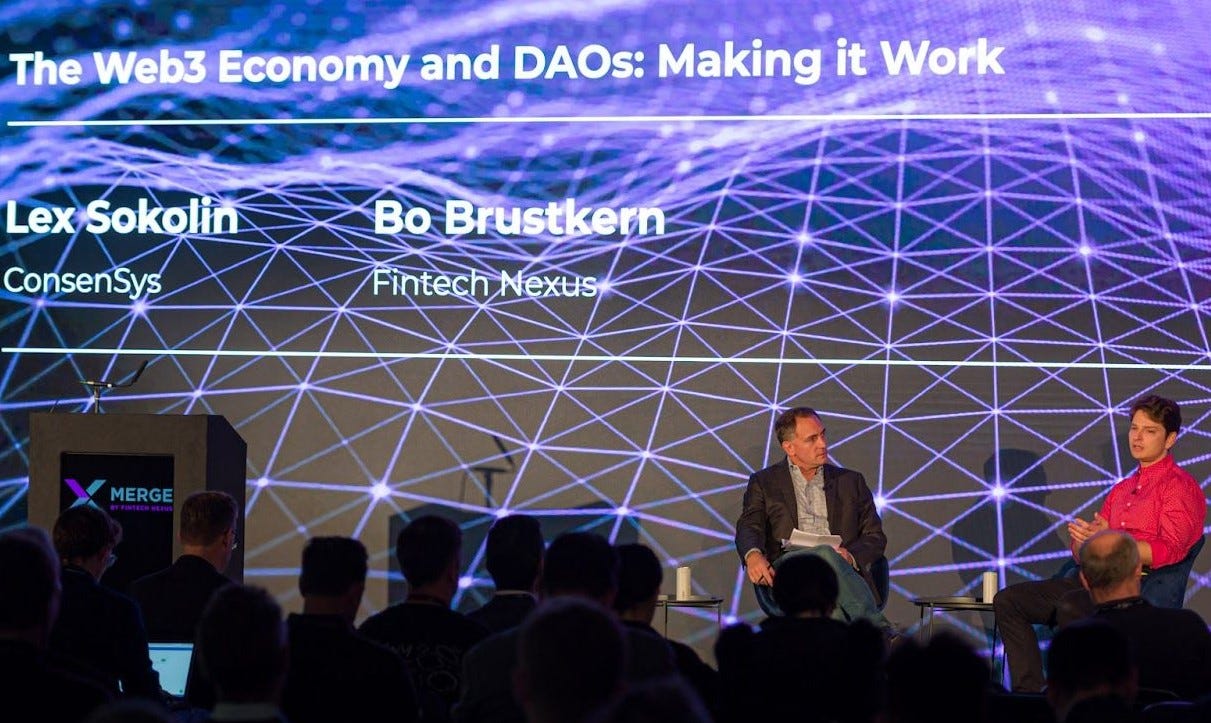
Fintech Nexus, (previously Lendit Fintech), has transformed its tried-and-true model of hosting top-end TradFi fintech events, creating a pipeline between traditional finance and web3. It was clear from arrival that this wasn’t the crew’s first rodeo. The London Tobacco Docks setting was transformed into a fully fledged conference hall, with space for networking, sponsors, and a lounge area that was constantly stocked with quality food and beverages. I overheard one attendee say he loves the Lendit events because you always know you’ll get a great lunch!
Lunch wasn’t the only thing on the menu … Merge London delivered a wide array of thoughtful panels (30 in two days 👀) hosted by BanklessDAO contributor Bo Brustkern, his partner and co-founder Peter Renton, the 11:FS crew (Mauricio Magaldi, David Brear, and Benjamin Ensor), with many other web3 and TradFi professionals as moderators.
Here’s a summary of just a few of the fantastic topics and presenters.
Lex Sokolin of ConsenSys on the future of DAOs and the bDAO / ConsenSys partnership:
DAOs are the fundamental building blocks out of which you’re getting cooperation, economic activity, and GDP.
Matt Hancock, former UK Secretary of State for Health and Social Care, on blockchain future and regulation in the UK:
There’s a revolution happening. This is going to change things for the better. The question of government is not how do we allow that to happen but what can we do to make it happen?
The list goes on, and there is already plenty to read about it on the Merge news page at Fintech Nexus, with more to come from the Fintech Nexus media team.
It felt as though government, fintech, and bank execs were there absorbing the gospel of DeFi, DAOs, law as code, and value of community. As put by Mona_El_Isa, we are guiding the future of asset management with decentralization and transparency.
Other common topics of discussion were compliance, mortgage lending, Women In Identity, moving real world assets on chain, UI/UX challenges, CBDCs, the metaverse, web3 payments, DIDs, and treasury management.
Meeting people at live events like this allows BanklessDAO to form new connections across industries. We even managed to set up a new podcast between Jaou Toure of Goldfinch and Bankless Africa! Looking forward to that one.
The next Fintech Nexus event is LatAm in Miami, December 13-14, 2022, and tickets are still available at the Fintech Nexus site!
#️⃣ WeAreDAO

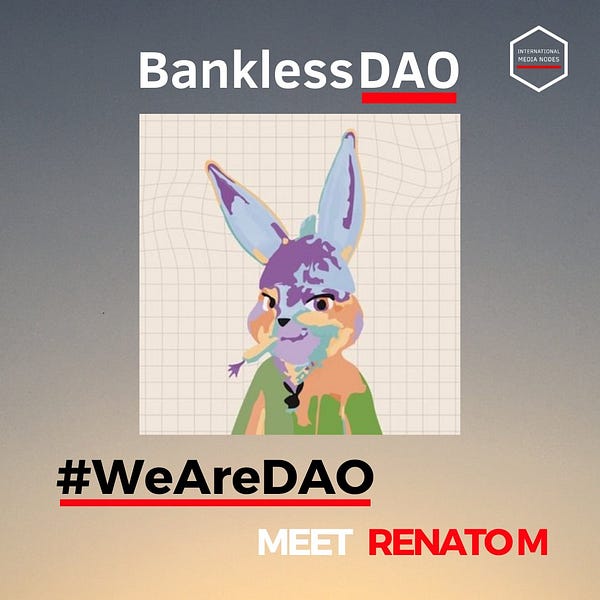
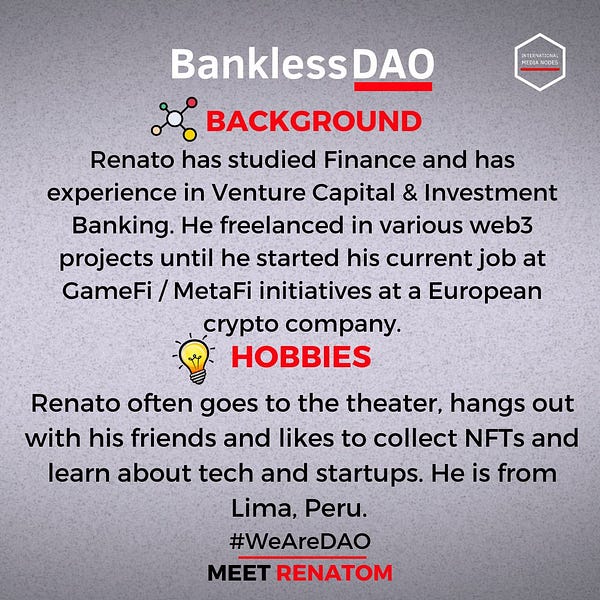
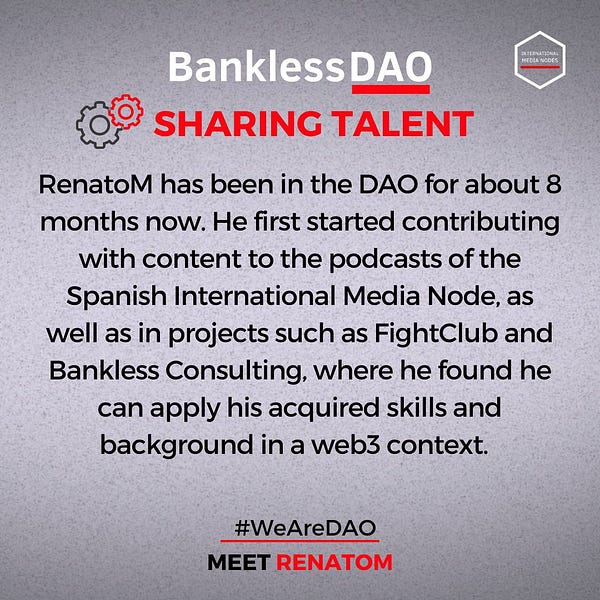
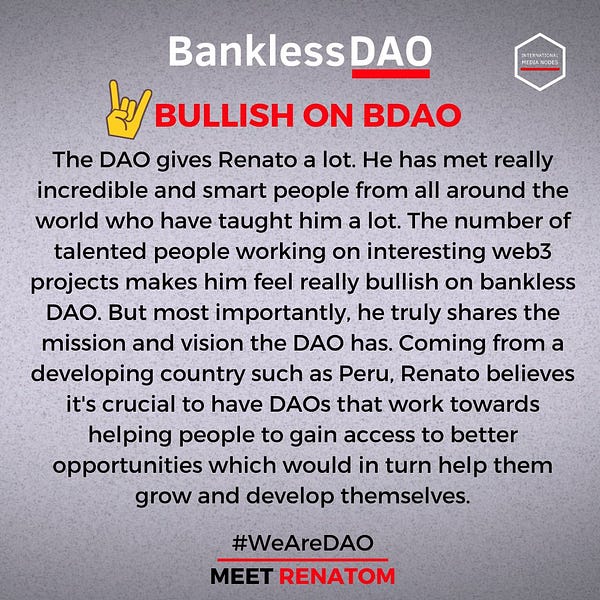
This week, stackthat.eth, fresh from nomination to L2, is in the Roll Call seat for his moment in the Barbados sun. Congratulations!
What is your favourite DeFi protocol?
Uniswap.What is your favourite ice-cream flavour?
Blueberry Cheesecake.Which of the NFTs that you own is your favourite?
The Fox Fonet Limited Collection of a Fox in the style of Claude Monet as Digital Art. [Editor’s Note: The link provided was a dead end, so I subbed this one 🙂)
Where would you love to travel to?
Barbados.What did you aspire to before you discovered crypto, and has that changed at all?
I've been working in technology for 15+ years; after the discovery of crypto it’s still the same only instead of web2 it's all about web3 now. Giving the financial power back to the user is something I strongly believe in wholeheartedly.
That’s it — short and sweet! If you would like to be featured in Kat’s Roll Call, take a few minutes to answer the questions via this form, and keep consuming the Weekly Rollup goodness.
🙏 Sponsor: MetaMask Institutional → The DeFi Wallet and Web3 Gateway for Organizations.
Fresh Content
🎙 BanklessDAO Podcasts
🧠 Crypto Sapiens Podcast

🌍 Bankless Africa




💰 Making Bank

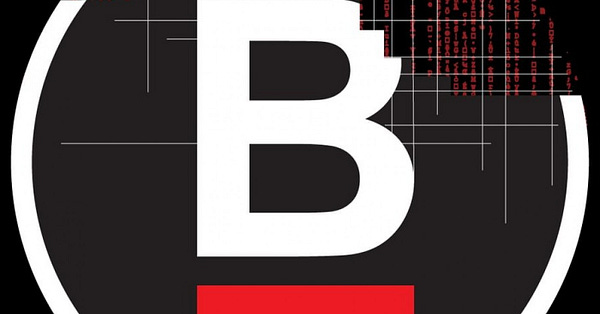
✍️ Bankless Publishing


🌏 Bankless Africa Newsletter

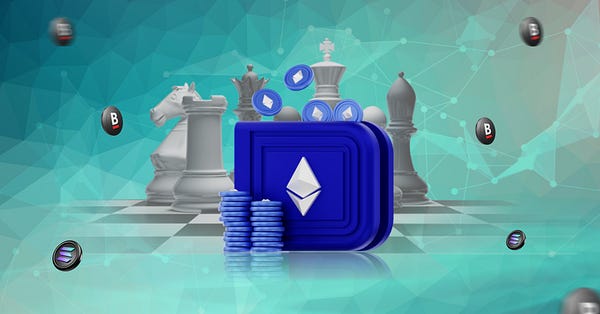
🗞 The Rug Newsletter


Learning Opportunities
🎁 DAOlationships Demos — Superfluid
Superfluid is a smart contract framework on EVM networks, enabling you to move assets on chain following predefined rules called agreements. With a single on-chain transaction, the money will flow from your wallet to the receiver in real time. Join us for a demo of Superfluid on Wednesday October 26 at 18:30 UTC in the watercooler voice channel. To set a reminder, RSVP to the event.
📈 How to BANK (Tokenomics)
Are you curious about the tokenomics and management of the BANK token? Join Ernest-of-Gaia in the watercooler voice channel on Tuesday October 25 at 13:00 UTC. Don't forget to RSVP to set a reminder for this event.
🧑🎓 BANK Utility: Uniswap and BANK
The BANK Utility series shows new members what they can do with their BANK tokens across different web3 protocols. This session will concentrate on BANK and Uniswap. If you would love to learn more on how to utilize your BANK tokens, Join Aloy on Wednesday October 26 at 13:00 UTC in the watercooler voice channel. To set a reminder, RSVP to the event.
👏 How to Coordinape
Coordinape is a platform that enables peers in the DAO to reward each other for their contributions in the previous month. But how does it work? And how can you be a part of it? Warrior will be taking you through all the basics on Thursday October 27 at 13:00 UTC in the watercooler voice channel. RSVP to get a reminder.
🎣 Phishing School
Authors: d0wnlore and the InfoSec Team
A Refresher on Protecting Your Computer or Mobile Phone
This week’s Phishing School is a refresher on how to keep your computer and mobile devices secure. These assets are arguably the most critical that you need to keep protected from potential attackers, as they can be a gateway to subsequent attacks against your other assets such as social media accounts and wallets (let alone possible theft of any data you have on these devices).
Let’s step through some examples of how you can harden your devices against attacks, also known as reducing your attack surface. We want to harden our devices so that viruses, malware, and other malicious applications are less likely to make their way into our device’s operating system deep enough to cause more permanent damage. We also want to protect our devices in case they are physically stolen and make it harder for the thieves to gain more useful value from them.
General Advice
Update your devices whenever a security update is released for your operating system. This is one of the key ways you can protect yourself from much of the scary viruses and malware you see in the news, as they remove or reduce the vulnerabilities used by those exploits.
If you have a device and/or operating system that is no longer supported by the manufacturer and does not receive security updates, consider replacing that device with a recent model, or switching the operating system to one that is guaranteed to have a longer support horizon. If the questionable device is a mobile phone, consider replacing it with a much older device that is likely to have a much lower attack surface than the complex mobile phones of today, such as a flip phone with a limited feature set.
Always lock your devices or set them to sleep mode when not in use. You can play this by ear depending on your threat model. But locking devices should be considered your default choice in an environment where you are not completely sure it is safe, such as a co-working space. Many companies set policies that employees should manually lock their devices when they are not near them, even in a secured office environment.
Use a strong, unique password or passcode for each of your devices. This is similar to the best practice of not reusing the same password across websites; if an attacker retrieves the password for one of your devices, they won’t be able to unlock all of them with the same password.
Computers
Regardless of your operating system, install antivirus or antimalware software. The era of Linux and Mac users getting away with not being in the spotlight of exploit developers is gone. Everyone should be doing what they can to protect their devices against viruses and malware. Start with your operating system's built-in protection if available, such as Windows Security, or install one, such as ClamAV or another scanner that you can run at a regular schedule.
If you are trying to protect a device with a higher risk of exposure, such as a shared family computer or one being used by those that are not tech-savvy, look into paying for consumer-grade Endpoint Detection & Response (EDR) software, such as Malwarebytes or a paid upgrade to your existing virus/malware scanner if it is available. This will protect your operating system in real time, instead of on a schedule used by the typical free virus/malware scanner.
Turn on your operating system's firewall and tune its settings so that it gives you the best protection without disrupting your productivity or fun. This will at least attempt to block inbound/outbound connections from software that have not been installed by you. While built-in firewalls for Windows and macOS are limited you can also download some that have more features or target specific methods of protecting your device.
Consider setting up virtual machine software so that you can perform potentially dangerous tasks in a sandbox environment, such as opening attachments from unknown senders. Harden the virtual machine's settings to further reduce chances of an incident, such as not allowing the virtual machine to read your host machine's clipboard and disabling its network connection.
Use a VPN, especially in a public environment such as café or library wireless networks. While the number of websites that enforce encrypted HTTPS traffic has grown enormously, not all of the web uses this protection. There can also be network hiccups and configuration issues that can lead to your traffic being sent unencrypted. VPNs and their secure tunnels reduce the capability of others on the public network to eavesdrop on your traffic.
Mobile Phones
Reduce the amount of applications you have installed, especially chat and social networking programs. The reality is that certain categories of software are attractive to malicious exploit developers and/or nation states, so much so that the chance of an unknown vulnerability being exploited — called a Zero-day — is getting higher, despite more money being put into securing these platforms.
Do an audit of the permissions you have given to applications on a regular basis. As you live your life and reassess your threat model, you may start rethinking about what kind of data you are willing to allow certain applications to collect. It is good to update these permissions as the comfort level of your security posture changes.
Get second opinions on the applications you are about to install from friends and family, especially those that ask for many permissions, are relatively new and may have questionable reviews on their app store. Malicious apps, especially for Android, are becoming a popular method of siphoning data and possibly sensitive information from their victims’ devices.
A Special Notice: Vote on InfoSec Team’s Season 6 Proposal
Since our team’s genesis at the beginning of 2022 we have been working our hardest to keep BanklessDAO a safe and secure space for our members to continue doing the work that drives them. For Season 6 we have more team members and more ambitious plans to help further our mission, but we need your eyes and votes to help us get there.
Please take a moment to review our Season 6 funding proposal and vote ‘Yes’ if you agree that BanklessDAO still needs the services of our InfoSec Team, which will lay down the foundation for us to help the wider crypto ecosystem as well!
🏛 Governance
🔍 JokeDAO Results: What Should BanklessDAO Focus On
After tallying the votes from 110 wallets, the JokeDAO results are in. BanklessDAO wants to focus on … tokenomics! The top five priorities are illustrated below. Click through to the Forum post for analysis and discussion.
🧐 Season 6 — Grants Committee Election Applications
The Grants Committee (GC) is responsible for managing the grants system, reviewing grant applications, and managing the grants treasury, with the help of other guilds as needed (e.g. Treasury). The GC consists of 5-7 members along with a multi-sig with all committee members as signers. There will be 5 seats open for the Season 6 Grants Committee. If you feel drawn to serve the DAO this way, you can share your application information in the comments.
Unfortunately, Grants Committee recently found the need to develop a Dismissal Procedure, and having done so, has enacted it to remove a member who has remained out of contact for several weeks. This was also raised in the recent Community Vote and the option to remove the inactive member received 84% support from a total of 69 votes.
Proposals in Discussion
Project Funding Framework Upgrade [Vibe Check]
GC member Jengajojo proposes three upgrades to the bDAO project funding framework, the first of which is to establish a new class of entities called ‘Incubators’ and upgrade some existing projects to this new structure. Incubators could setup their own guidelines on project acceptance, develop a standard price list for incubation, and establish a ‘graduation’ criteria for incubating projects. This is a detailed proposal which deserves close attention from the community.
✅ Action Items
📖 Vote: The draft Season 6 specification is live on the Forum.
✍️ Apply: Grants Committee applications are open. Head to the Forum to submit.
🧐 Consider: A project funding upgrade framework proposal is on the Forum.
🏃♀️ Catch up: Review this week's Community Call notes or listen to the recording.
🙏 Sponsored by MetaMask Institutional
🤣 Meme of the Week
Thanks Jake and Stake! True story apparently!











